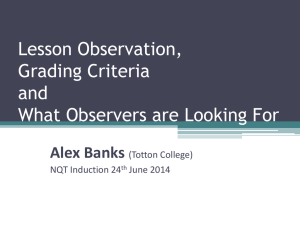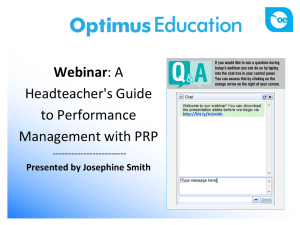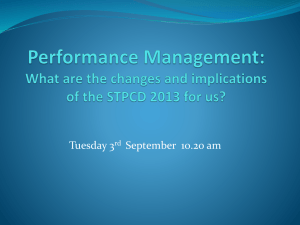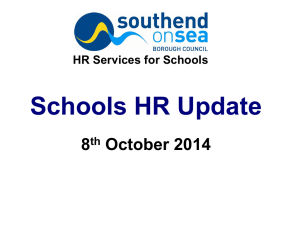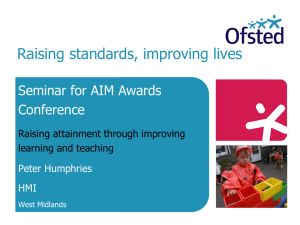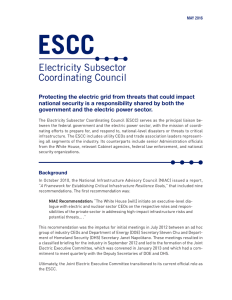Item 4 Stephanie Weeden Slides for HT presentation 28
advertisement
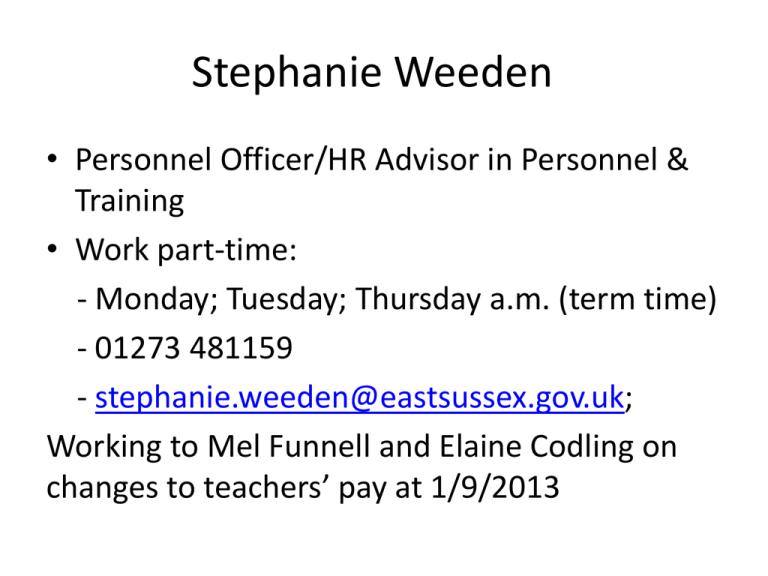
Stephanie Weeden • Personnel Officer/HR Advisor in Personnel & Training • Work part-time: - Monday; Tuesday; Thursday a.m. (term time) - 01273 481159 - stephanie.weeden@eastsussex.gov.uk; Working to Mel Funnell and Elaine Codling on changes to teachers’ pay at 1/9/2013 1% pay award and finalised STPCD • Issued yesterday • 1% applies to all scales and allowances but not to safeguarded sums – hard copies available today, with web address. • Minimal changes to STPCD – one change relates to set criteria for UPS progression (addressed later) Changes apply when? • From 1 September 2013, once decisions have been made on pay changes arising from this academic year - Main scale teacher progression; - threshold round 13; - UPS progression; - AST progression Affected by the changes: • Teachers on the unqualified, main, upper pay scales • Advanced Skills Teachers and Excellent Teachers Not affected by the changes: • Principals, Executive Headteachers, Headteachers, Heads of School, Deputy Heads, Assistant Heads (STRB remit for leadership pay – Local Government response) • Support staff Introduction of fixed-term TLR3 • Minimum of £500 per year, maximum of £2500 • Applies to existing TLR1 or TLR2 post holder? • In job description? • Formalise? Removal of AST role and introduction of Leading Practitioner role • ASTs and ET posts discontinued • Leading Practitioner role introduce • An end to outreach work ? Removal of three year time limit on R&R allowances • STPCD: not to be used for Teaching & Learning reasons, nor to reward for performance • ‘regular formal review’ • the expected duration of the allowance • review date after which it may be withdrawn • repeated renewing; accruing employment rights; risk of safeguarding payments Introduction of pay differentials • ESCC: additional ‘half point’ values • ESCC: sheet with values of these, including the newly awarded 1% • ESCC: Finance spreadsheets for maintained schools and academies to help with budget forecasting • decision to award an increase must be related to performance • recommendation on pay must be made in writing to (Pay Committee?) who must ‘have regard’ • increases must be differentiated, such that the amount of any increase is “clearly attributable” to the performance of the teacher • Teacher should be a reasonable expectation of progressing to the top of their respective pay range if performing well Wholly objective: Ofsted criteria • ESCC's framework for assessing teacher performance via collection of evidence based on Ofsted standards • Outcome: teachers placed into one of four categories in the context of determining a performance pay award (outstanding / good / requires improvement / unsatisfactory) • HTs will make performance pay awards for 'good ' or 'outstanding‘ only • ‘working towards good’ equates to ‘requires improvement’ so will not be awarded pay • aligns well with strategies for school improvement and effective resource management?” • Teacher does not have to be under competency policy in order to receive no performance pay award Ofsted Inspection • Ofsted Inspectors take account of effective appraisal and evidence of pay decisions – these are influencing factors in the judgement of quality of leadership and management • consideration of how well the head manages staff performance: − seek evidence that good performance is recognised in the performance management process and − that poor performance is rigorously challenged, with training and support provided • consideration of how well the head uses the staff budget to differentiate appropriately between high and low performers • Ofsted Inspector Guidance is appended to draft model pay policy. More flexibility on starting salaries • Appointing a teacher from another school - no requirement to match existing salary • Concerns: UPR teachers disadvantaged/discriminated against? • Realistic approach/assessment – if you want experience, you will need to pay for it • Comparable posts within school/alliance should inform • Advertisement for main can only result in appointment of main range • Will alliances/clusters agree and adopt the same arrangements for transferable pay between each other? Application for Upper Pay Range • Changed wording in yesterday’s finalised STPCD • Criteria for successful UPR application is set • Schools put in their policy how they interpret the set criteria, but may stay within the natural meanings of the words used • Governors consider applications, which must have a HT recommendation attached • Teachers with QTS can apply ‘at least once a year’ – do you want to narrow that down? Anticipated ‘pinch points’ • Equalities - you already undertake performance-based pay for UPS teachers – the overall meaning is the same. • Teachers to know and understand at Appraisal what performance will achieve ‘good’ or ‘outstanding’; and what pay that might attract. Pinch points, continued • Appraisers must recommend on pay progression at that meeting, with the teacher there. • Skills needed to hold that potentially difficult conversation • Appraiser training? Pinch points, continued • Part-time teachers - Disadvantaged if lack of opportunity to undertake work which might demonstrate ‘good’ or ‘outstanding’ performance. - Not able to demonstrate UPS criteria of substantial and sustained contribution, limiting opportunity to access/progress on UPR? Dealing with absence in context of pay progression • Can’t take account of maternity absence • Lynton has consulted on wording which allows her to ‘consider, in a compassionate way’ whether a teacher who is on Stage 1 absence or beyond, should be awarded performance pay.
